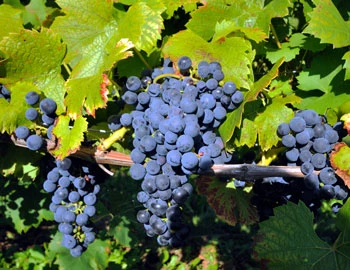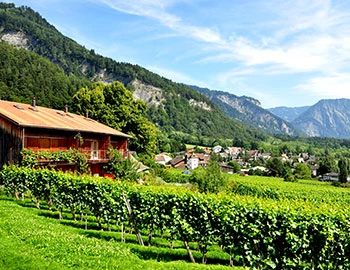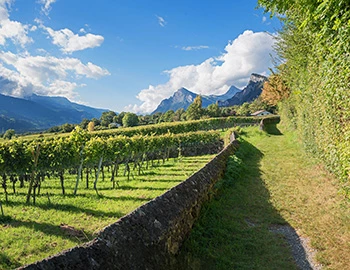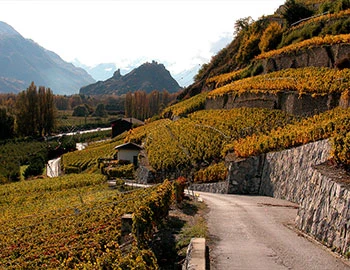Fläscher Pinot Noir Herrenacker 2021
AOC Graubünden, Weingut Hansruedi Adank, 750 ml

| Grape variety: | Pinot noir |
| Producer: | Hansruedi Adank |
| Origin: | Switzerland / Ostschweiz / Graubünden |
| Other vintages: |
Description
This Pinot Noir from the single vineyard "Herrenacker" exudes an animating spiciness, finest roasted aromas, black cherry, ripe wild berries and a hint of rose petals. The dark fruit aromas are reflected on the palate, accompanied by an excellently integrated acidity, which keeps the power and freshness of this wine in balance. Deep, well- structured and with velvety tannins, this powerhouse demands hearty dishes such as braised meat or game dishes with polenta. Our tip: at this youthful stage, aerate the wine a little in the glass before enjoying it.
Attributes
| Origin: | Switzerland / Ostschweiz / Graubünden |
| Grape variety: | Pinot noir |
| Label: | Vegan |
| Ripening potential: | 2 to 15 years |
| Drinking temperature: | 16 to 18 °C |
| Food Pairing: | Beef Stroganoff, Roast saddle of venison, Saddle of lamb fillet with herb jus, Châteaubriand, Filet Wellington, Roasted lamb gigot, Cheese board |
| Harvest: | hand-picking |
| Volume: | 13.0 % |
| Note: | Contains sulphites |
Pinot noir
Blueprint of the terroir
No other variety expresses its terroir as precisely as Pinot noir. It is a sensitive, fragile grape. But when it succeeds, it gives the world some of its very greatest wine plants. It especially excels in Burgundy, where it has been cultivated for at least 700 years. Even in the middle ages, it was considered so precious that it was kept separate from other grapes so as to not diminish its value. The finest examples are delicate and fragrant with aromas of cherries and red berries. With maturity, notes of forest floor, leather and truffles enter as well. An irresistible fruity sweetness still shines through, even after several decades. The Pinot noir does well in cool locations: in Switzerland and in Germany, where it is known as Blauburgunder and Spätburgunder respectively; in Alsace and in South Tyrol, in Oregon, New Zealand and Tasmania. Not least, it yields fantastic champagnes. It is a wonderful culinary companion. With its soft tannins and charming bouquet, it meshes with everything, from Güggeli and cheeses to fried fish.

Graubünden
Graubünden: Mecca for Burgundy varieties
Nowhere in Switzerland has a better ratio of first-class Pinot noir crops to cultivation area than Graubünden. The ageing philosophy of vintners here leaves its imprint even more than the subtle differences in terroir from one vineyard village to the next. In recent years, three Pinot types have established themselves here: the light and sweet Herrschäftler for everyday drinking, the selections aged in large wooden barrels or used barriques, and of course the premium selections of individual estates matured in barriques.

Ostschweiz
Eastern Switzerland: an intriguing puzzle
Eastern Switzerland has long been positioned on the northern rim of the climate zone where the cultivation of popular Swiss varieties is possible. Due to a warming climate, the vineyards of Aargau, Zurich, Schaffhausen, Thurgau and Graubünden are now in the zone where varieties such as Müller-Thurgau or Pinot Noir succeed excellently. But even long-established, almost-forgotten varieties such as Elbling, Räuschling and Completer are experiencing a renaissance.

Switzerland
Switzerland – A small country with enormous diversity
Switzerland is famous for its banks, watches, and cheese, but not necessarily for its wine. The Swiss didn't invent wine, but they have been extremely open and curious to it. Wine culture arrived in what is now modern Switzerland via several routes: from Marseilles to Lake Geneva and the Lower Valais region; from the Aosta Valley through the Great St. Bernard Pass to the rest of Valais; from the Rhone through Burgundy, across the Jura Mountains to Lake Constance; and from Lombardy to Ticino, and then on to Grisons.



